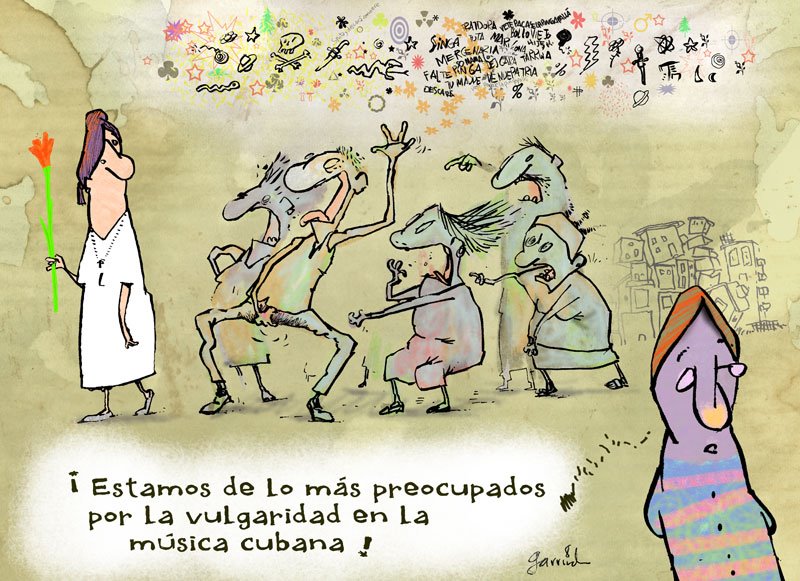
I’m curious to know the great influences of the reggaetoner Osmani Garcia, “The Voice” at the top of the Cuban charts. Good friends should be there. Not every reggaetoner achieved the status of censored celebrity displayed today by Chupi Chupi, turned into an ugly duckling of the radio stations, but a white swan of popular festivals, MP3 players, taxis, city buses and DVDs in national circulation.
The business is booming: Osmani Garcia must show some outrage at the avalanche of criticism officials have directed to his reggaeton, but only a little; his pocket knows he’s not suffering too much. If before the Scarlet Letter destined for it, his Chupi Chupi was the essential hit to shake one’s hips to on the Island, I wonder how much it would cost now to go to a Havana club to see “The Voice” together with the “dream team” that gave birth to seven-and-a-half minute song, a real record for the genre.
We know the premise: Cuba needs reasons to never bury the hatchet of war. My country is an eternal theater of war, where a child, Elian, was once missing, five or four-and-a-half heroes are prisoners of the empire, there is a cyber war or an embargo, they would have to invent something. The show must go on.
And when all is calm, you have to launch an attack, let’s say, against a domestic enemy. The State Council rolls the dice, Abel Prieto appears in the combination, and is told, “The flag is yours.” Thus begins the new Crusade against a film, a novel or a soap opera, a card game for children, or Chupi Chupi. It doesn’t matter.
Nice and paradoxical: the very people whom they distract in their scarcities under the Roman principle of “To the common people, bread and circuses, and if there is no bread, more circuses,” they now say that the circus should be sane. That the lions should not rip off more than one gladiator’s arm each time.
Above the musical aesthetic stance, one wonders if indeed Chupi Chupi which the Cuban press today accuses of being a musical aberration, differs in any way from the hundreds of thousands of similar songs which, give or take a few words, contain the same ingredients, and have never provoked a comment by the Minister of Culture on the Roundtable News program… (Cuba and its fertile mania for euphemisms: “news”).
Cabrera Infante titled a volume of short stories “Guilty of Dancing the Cha Cha Cha.” Now they would have it be a crime to sing Chupi Chupi, and the two charges are formulated basically as follows:

Charge No. 1: Chupi Chupi is an ode to fellatio, a monument to oral sex (I say: without which all intercourse would be a boring caricature of itself).
Okay, so what? So was that “Suck Lollipop” from the SBS trio that exploded in the ’90s in every Cuban nightclub, without trumpets of “to the slaughter” or blushing professors.
Other pre-reggaeton Cuban pearls of Cuban that passed from oral preambles and focused on intercourse pure and simple, although protected: “Use a Condom” from Charanga Habanera was a nineties anthem, on the radio, displayed in public, sung on television , but apparently the Puritan censors at the Ministry of Culture were called to attention for a new circus number.
Charge No. 2: Chupi Chupi is a hateful sexist reference, where lyrics, music and video relegate women to the status of an instrument of pleasure.
Confirmed. Are they going to ban then, under official decree, every reggaeton piece flowing through the Island, whether of domestic or foreign manufacture?
Because it’s a hard business to find a single album of the genre, just one, where the sublimation of a macho culture is not the primary seasoning, and where the optical reference to women is not the same as used by brown Santiaguans during a conga in the Guillermón Moncada massacre.
The arguments of the newspaper Granma make one burst out laughing, as they explain why the Luciferian Chupi Chupi deserves to be expelled from the media Olympus: sexist, vulgar, oversexed, devoid of ethical and moral values? I wonder where the tropical monks were, the protectors of Cuban morality, when “Classic Eminence” monopolized radio and television frequencies in the country with a delicate chorus that said, “Mami pitcheeea/ Que tu papi la batea/ Pitcheeea/ Cántame el strike donde sea.”

What is there to envy in the crude bite of Chupi Chupi versus the chorus of another omnipresent hit in its time in Cuba, in the mouth of Insurgent and Baby Lords (yes, the same guy who tattooed his commander – Fidel – on his shoulder) shouting: “I take my bat to the pitcher’s wife / I like the meat of the butcher’s wife / The woman in cop car asked for my gun / And the fire firefighter’s wife is setting me on fire.”
But above all: Are the rulers of my country going to be eternal discoverers of warm waters. Will they always “discover” too late that the drugs are swarming in, that prostitution doesn’t only happen on the Malecon, that the Marabu weed is the new national symbol rather than the Royal Palm, and that the vulgarization of the whole society involves more serious issues than Chupi Chupi which is just the last guest to arrive?
Have the sociologists and doctors who publish in Granma looked at what five-year-old girls in Cuba are wearing, with lycra and shorts with their butts hanging out? Have they listened to the aspirations of quinceañeras whose dreams of prosperity involve finding the best foreigner to pay for them and take them to live a dream of wealth and unhappiness abroad?
Are they aware of what is to pay with genital suction, or an equine wiggle of the hips in the bathroom, according to the “amusing” anecdote told in Amsterdam by the eldest daughter of the president himself? Have they taken the time to explore the causes and consequences of girls who, in exchange for ten dollars, star in dizzying lesbian pictures, where they are photographed, filmed, humiliated, drugged, and if something goes wrong with the affair, they die?
Probably not. Cuba and its press are specialists in the branches, never in the roots.
It’s simple, it’s good to see, to demonize a song today as an exemplary warning against a more filthy, more degrading and real evil: the vulgarization of Cuban society which does not happen because young people like reggaeton, or because a Videoclip Festival nominates Chupi Chupi (for its undoubted merit as an audiovisual production). That is just the tip of the iceberg sustained on another basis: the huge loss of values of this society, an evil that always goes hand in hand with poverty.
It’s not me who said it. Ryszard Kapuscinski said it before: “Never has full honor and dignity existed in a people with misery. When there is misery, man corrodes, self-destructs, loses his love and solidarity. Whoever doubts it, toss a crust of bread to a hungry crowd, and see what happens.”
No, I would not want my future children dancing to Chupi Chupi at their children’s parties. I do not want sexual messages to be the order of the day in their children’s ears. But beyond that, I would not want any Cuban child to grow up affected by the shortages, losing her sisters in the arms of a chubby Italian, learning that by robbery, fraud and pimping one can live better than by studying for a university degree .
All Cuban parents, I am sure, all parents and teachers of this society adrift, know how to deal in their teaching ephemeral with products as ephemeral as Chupi Chupi. They know how to counteract any unhealthy effect that songs like this inject in minds in training (for those already formed, let no one come to us to say that the message of reggaetón is bad. Are we?).
But do the parents know, do Cuban teachers know, how to deal with the social degradation that awaits the young once they finish their moral lessons and emerge into the real Cuba?
*Translator’s note: The cartoon shows a lone Lady in White being threatened by an unruly mob, indistinguishable from the sort the regime calls together for its “repudiation rallies.” Are they harassing this flower-carrying so-called “enemy mercenary in the pay of the empire”? Or are they simply singing Chupi Chupi… a song the regime is also attacking through the media.
November 28 2011
